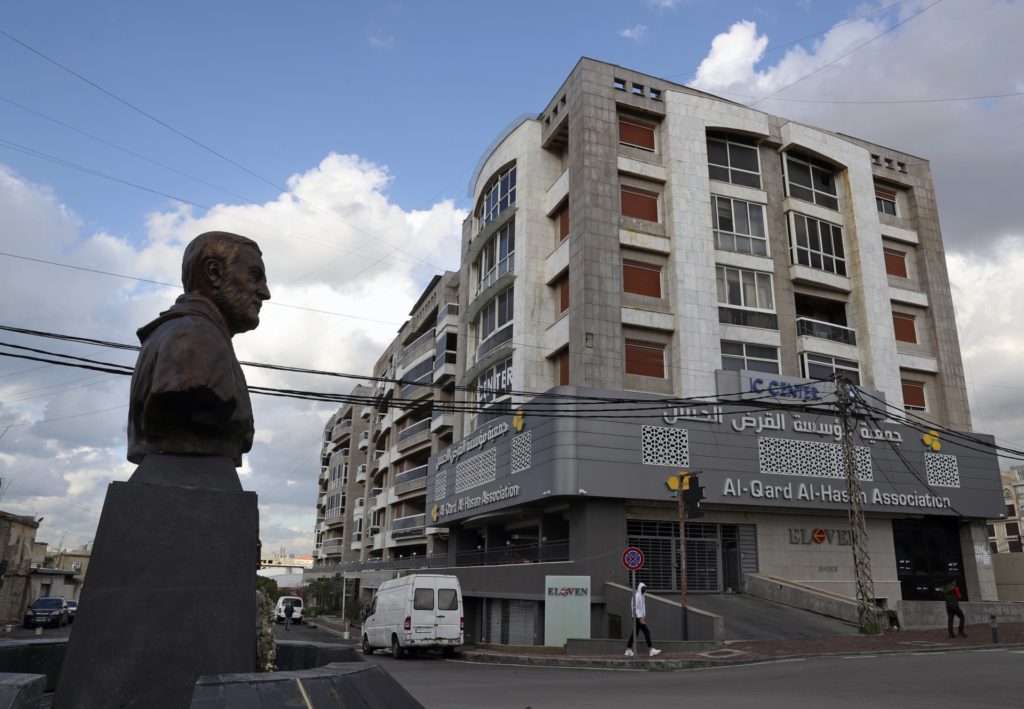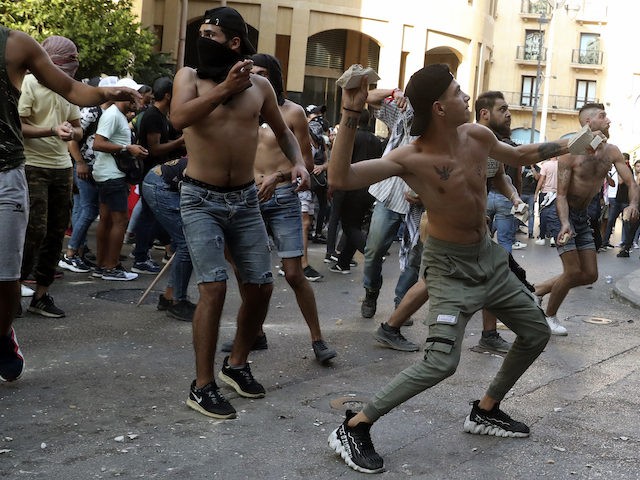Protests erupted across Lebanon on Wednesday, the first anniversary of the gigantic explosion at the Port of Beirut, against Iran and its proxy terrorist organization Hezbollah, reportedly leaving dozens injured.
Demonstrators in Beirut chanted, “Iran out! Iran out!” and demanded action against Hezbollah, which is also the most powerful political party in Lebanon and a prime suspect in concealing the huge cache of explosives that destroyed the port.
“Iran Out” picked up steam as a slogan and hashtag in Lebanon in June, when a Hezbollah stronghold near the Beirut airport unveiled a huge bronze bust of Iranian Gen. Qassem Soleimani, the terrorist mastermind killed by a U.S. airstrike in January 2020 while he was plotting attacks against American troops and the U.S. Embassy in Iraq.
Critics of Hezbollah found the statue ostentatious and offensive, calling it an act of “cultural aggression” against powerless, suffering Lebanese and describing Beirut as a city “occupied” by Iranian loyalists.

A statue of Iranian General Qassem Soleimani, former head of Iran’s Quds force, stands in front of a branch of the Hezbollah-run Qard al-Hassan Association, in Ghobeiry, Lebanon, Wednesday, Jan. 20, 2021. (AP Photo/Bilal Hussein)
Hezbollah survived a torrent of public outrage after the explosion, in part by making it clear they were prepared to kill anyone who tried to hold them responsible for it. Lebanon is mired in hopeless poverty and its social services are completely bankrupt, but Hezbollah never has trouble financing huge purchases of guns, bombs, and rockets at discount prices from its favorite supplier, Iran. Wednesday’s demonstrators expressed considerable frustration with this arrangement.
The Lebanese are frustrated with every other element of their dysfunctional government, as well. In a one-year anniversary investigative report published on Monday, Human Rights Watch (HRW) noted that just about every faction in Lebanese politics “installed loyalists in prominent positions in the port, often positioning them to accrue wealth, siphon off state revenues, smuggle goods, and evade taxes in ways that benefit them or people connected to them.”
This means every faction is unwilling to admit its culpability but very eager to accuse every other faction of corruption, creating a permanent political standoff in which no party can afford to sacrifice an inch of its bureaucratic turf.
The Lebanese people likewise express constant frustration with their system, but Shiites feel their interests will be dangerously compromised if Shiite parties like Hezbollah are weakened by accountability. Sunnis feel the same about Sunni politicians, and so on.
As HRW noted, Hezbollah is objectively the worst abuser of the Port of Beirut, the party most interested in using it to smuggle explosives, and the party with the most direct bureaucratic control over the port. They also are most likely to know what happened to the hundreds of tons of ammonium nitrate that did not explode in August 2020 because they had already been spirited off to destinations unknown.
Riot police used water cannons, rubber bullets, and tear gas against protesters, who threw rocks, lit fires, and tried to storm the headquarters of the Lebanese parliament.
Protesters #clash with security forces near #Beirut's parliament on the anniversary of the city's deadly port explosion. https://t.co/nAUHy8Yd1K pic.twitter.com/cpStgE2E95
— Al Arabiya English (@AlArabiya_Eng) August 4, 2021
Demonstrators were outraged that a full year has passed without any perceptible progress in their paralyzed government’s investigation of the explosion, which killed 214 people and dealt a crippling blow to the already weak economy of Lebanon.
A year after the explosion, with the Wuhan coronavirus still weighing heavily on the country, Lebanese often get into fistfights over food at the barren grocery stores. Despite this growing misery, no government official has yet been held responsible for the blast. Lebanon has not even had a fully functioning government since former Prime Minister Hassan Diab resigned shortly after the explosion.
“We will not forget and we will not forgive them ever. And if they can’t bring them to account, we will by our own hands,” a protester in Beirut cried on Wednesday, clutching a photo of a son who died in the explosion.
Photos of the dead were common accessories for protesters as they gathered around the still-devastated Port of Beirut. One of its buildings was adorned with a giant banner that proclaimed the people of Lebanon are “Hostages of a Murderous State.”
Lebanon’s Daily Star reported “dozens” of injuries in scuffles between protesters and the police, who warned they would “resort to legitimate and proportional means” against “non-peaceful demonstrators.” Local television footage showed the police response included at least one armored vehicle.

COMMENTS
Please let us know if you're having issues with commenting.